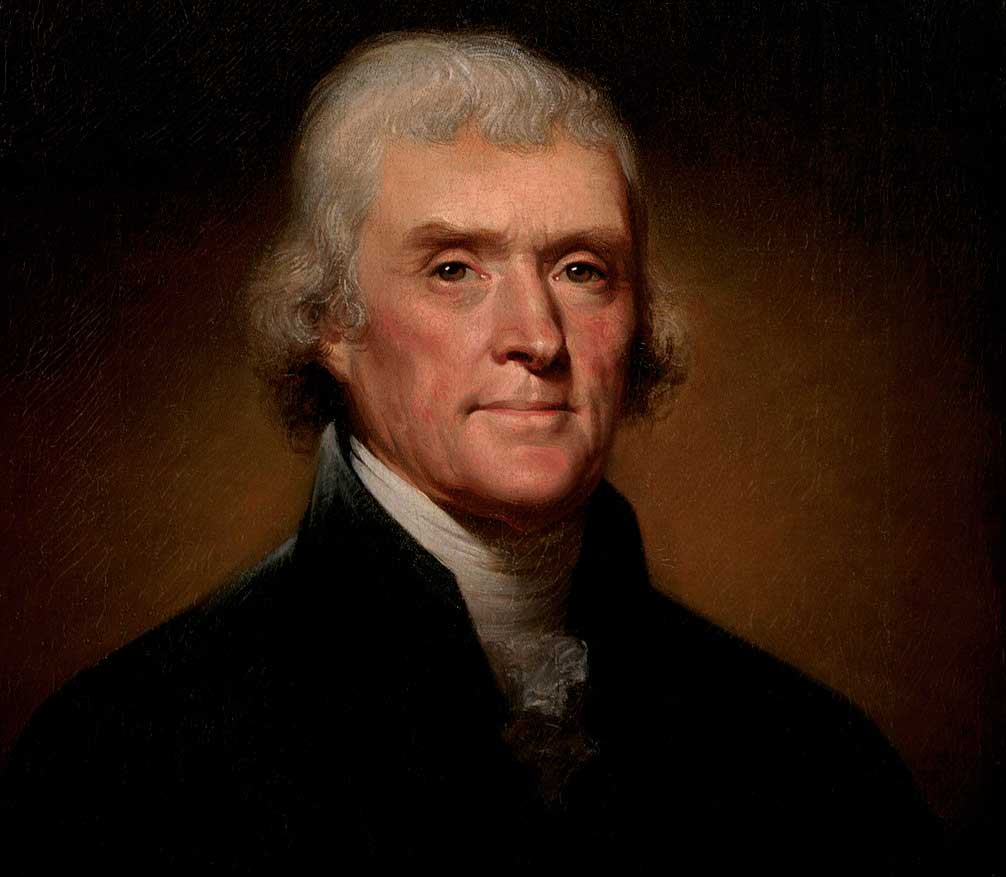7 Lies About Thomas Jefferson, a Bible-Believing Christian
The Founding Fathers of the United States of America have long been remembered as some of the most inspired people to inhabit this planet. Their commitment to freedom and the ideas they came together to shape into the Declaration of Independence and later the Constitution has carried the principles of fundamental human rights and the proper role of government in preserving while not interfering with those rights in one degree or another to most of the countries throughout the world.
But over the period of time since they lived their lives, gave their contributions, and have been gone from this world, unable to defend their character and unable to explain to contemporary society the motivation behind what they accomplished, there have arisen those who would cast doubt on the Founding Fathers.
Thomas Jefferson was one of the most prominent and influential men in the creation of this country. However, even in its citation of him as one of the 20 Most Influential Americans of All Time, Time Magazine points out his “inconsistencies” while admitting that he “has fared the worst of at the hands of revisionists.”
If you believe the Biblical precept taught by Jesus, “by their fruits shall ye know them”, it’s hard to understand how Thomas Jefferson could be a man as lacking in consistent character as recent historians have made him out to be while having been one of the biggest advocates of all time for equality, morality, freedom, and other noble concepts. Although it’s understood that nobody is perfect outside of the Savior himself, the idea that Thomas Jefferson was such a hypocrite as what historians have made him out to be simply doesn’t seem to line up with everything that he accomplished in his life to further the opportunities for everyone to be granted “life, liberty, and the pursuit of happiness.” How can this be so?
Revisionist historians, whose own lack of character causes them to cast aspersions at a man (similar to others of the founders, like Benjamin Franklin) they simply can’t understand. Rather than attempt to elevate themselves to be able to empathize with a man of the standing of Thomas Jefferson, it’s easier to simply attempt to pull him down to their level.
When David Barton published his book, The Jefferson Lies: Exposing Myths You’ve Always Believed About Thomas Jefferson in 2011, it was promptly attacked with possibly as much vigor as Jefferson himself had been. Barton presents seven lies that have been made up about Thomas Jefferson and handed down over the years as facts intended to undermine the divine founding of the country by chopping down one of its main pillars, making him out to be a severely flawed hypocrite.
Here are the seven most notorious lies about Thomas Jefferson as presented by David Barton:
- Thomas Jefferson had sexual relationships with his slave, Sally Hemmings, and fathered children by her.
- Thomas Jefferson founded the University of Virginia as a secular institution because he was antireligious.
- Thomas Jefferson didn’t like the Bible, so he created his own version of it, what’s known as the “Jefferson Bible”.
- Thomas Jefferson was racist, and didn’t consider black people to be equal to whites.
- Thomas Jefferson’s idea of separating church and state meant that only secular ideas should be used in public discussion.
- Thomas Jefferson was against organized religion and hated religious clergy.
- Thomas Jefferson was an anti-Christian atheist.
I will summarize the evidence that Barton uses to disprove these lies. If you’d like to dig deeper into the evidence, feel free to hop on over to Amazon and pick up the book or listen to it on Audible.
Thomas Jefferson Fathered Children by Sally Hemmings
Three categories of evidence are used by revisionist historians to accuse Thomas Jefferson of having a sexual relationship with Sally Hemmings, a black slave girl owned by Jefferson as part of his Monticello plantation.
The first type of evidence presented by those who argue for Jefferson’s role with Sally Hemmings is DNA based. The second is oral tradition (Thomas Woodson was said to be the son of Thomas Jefferson and Sally Hemings ) that was actually disproved by DNA testing, which showed that Woodson didn’t have any Jefferson blood in him. The third category of evidence came from several newspaper articles written by James Callendar, an unpredictable journalist with a history of stirring up trouble by writing spurious and inflammatory accusations that made him guilty of violating the federal Sedition Law. Callendar’s accusations against Jefferson as having an immoral relationship with Hemmings were clearly part of his attempt to seek revenge on Jefferson.
Despite conclusive-sounding headlines from newspapers such as the USA Today, US News and World Report, the Washington Post, and the New York Times in 1998 asserting that DNA evidence proved that Thomas Jefferson was the father of some of Sally Hemmings children, the evidence is anything but conclusive. The closest that DNA testing could come to establishing a sexual relationship between Thomas Jefferson and Sally Hemmings was that “some Jefferson male – and there were twenty-six Jefferson males living in the area at the time – had a relationship with Sally Hemmings that resulted in the birth of Eston”. (Eston was Hemmings youngest son.)
Based upon several pieces of evidence that vindicate Thomas Jefferson, it was much more likely that Randolph Jefferson, Thomas Jefferson’s younger brother, would have had a sexual relationship with Sally Hemings than that Thomas Jefferson would have.
It turned out that the “smoking gun” of DNA evidence presented in 1998 and promoted as part of a political statement to justify Bill Clinton’s sexual misconduct was anything but a smoking gun. The DNA-based accusation was later retracted, but none of the media outlets bothered to correct their mistake. Tthe damage to Jefferson’s reputation had been done. After the whole fiasco, the Wall Street Journal mentioned of the unreported DNA evidence retraction that it, “comes a little late to change the hundreds of headlines fingering Jefferson.”
Instead of being intellectually honest about the fact that there is no link between Thomas Jefferson and Sally Hemmings, modern society continues to insist on believing the lie.
Thomas Jefferson Founded A Secular University Of Virginia
Thomas Jefferson, an ardent supporter of education, founded the University of Virginia. Historians who have made it their ambition to turn him into a secularist, have taken the approach that his founding of the University of Virginia demonstrates his commitment to keeping Christianity out of public education.
The truth is that Jefferson himself was educated with a highly Christian upbringing, trained under what’s called the Scottish Common Sense educational philosophy, which includes tenets that reinforce a belief in God, that he has given everyone a conscience that helps them make moral decisions, that law, government, education, and other aspects of temporal life are governed by God’s first principles, and that there is no conflict between man’s reason and the revelation he is entitled to from God. Jefferson never went away from the educational training he was given as a youth. In fact, he recruited religious leaders as teachers for schools he managed, and he fully expected them to teach secular subjects in context of religious observations.
Prior to founding the University of Virginia, there is clear evidence that Thomas Jefferson’s other academic endeavors were clearly based on a Christian foundation. Rather than founding the University of Virginia on a particular denomination, as Harvard, Yale, Dartmouth, William and Mary, Princeton, and others were, Jefferson’s university was to be transdenominational, capable of serving students from a range of religious sects.
It is clear that Jefferson’s intentions with the University of Virginia weren’t to have a non-religious public university. Instead, his intent was to have a university that could serve the needs of people of varying religious beliefs.
Thomas Jefferson Didn’t Like the Bible
This lie about Thomas Jefferson is yet another inconsistency that historians have introduced, but which they’ve been successful at promoting among American educators. Jefferson used the Bible frequently in his own writings, and often handed out Bibles as gifts. He was also a lifelong member of the Virginia Bible Society.
There are plenty of other pieces of evidence that Thomas Jefferson loved the Bible and valued it as the foundation of his moral belief system.
Where does this lie come from, that Jefferson didn’t like the Bible, so he invented his own version?
Wikipedia’s description of the Jefferson Bible currently promotes the idea that Jefferson’s heavily edited compilation of the Bible is “consistent with his naturalistic outlook and intent”, and that his version of the Bible “reject[s] the resurrection of Jesus.” Jefferson’s own words about the purpose of his Bible abridgment, to be a “digest of Jesus’ moral doctrines, extracted in His own words from the Evangelists” give clear context what he was doing. Historians who would argue to the contrary still face the fact that Jefferson did include miracles in his Bible abridgment, including the raising of Jarius daughter from the dead, the healing of the woman who had a hemorrhage, and the healing of two blind men, all supernatural occurrences recorded in Matthew 9. Jefferson’s Bible abridgment also includes Jesus’ declaration that he was the Son of God in Mark 14, his teaching about hell in Matthew 10, and his teaching about eternal life in Matthew 19.
Those who would argue Jefferson denied Jesus’ claim to divinity, including his resurrection, use as their rationale the fact that Jefferson’s abridgment concludes with the end of John 19, which records Jesus’ burial in a sepulcher after his death. However, argument doesn’t hold up in consideration of the other passages, including about the resurrection, that comprise the Jefferson Bible.
Indeed, secularist historians try too hard to make Jefferson one of their own, when it was clear that he wasn’t. He was a highly religious man. The unrevised evidence shows that believed in the teachings of the Bible, including ones that are miraculous. There really is no Jefferson Bible as produced by Thomas Jefferson himself. Instead, as one historian concluded:
Unfortunately, all those who have published the “Jefferson Bible” since 1903 have been almost universally either Unitarian or rationalist and secular in their approach, and their introductions to the book have…misrepresented Jefferson’s motivations and beliefs to conform to their own theological assumptions or agendas.
Thomas Jefferson Was Racist
Civil rights leaders of past generations have looked to Thomas Jefferson as one who sought for equality among the races, starting with emancipation from slavery.
Jefferson’s own words and actions demonstrate that he was not a racist as modern historians make him out to be. He sought for emancipation of slaves in Virginia, where the process tended to be much more complicated than in the states further north.
Jefferson inherited about 20 slaves as a fourteen year old, and was made owner of 135 more slaves when he married Martha Skelton. Freeing his slaves required, by Virginia law, a substantial financial investment to provide a livelihood for them. Jefferson was unable to do so, because of his financial limitations, which came from the debt he incurred from his father-in-law, from the financial obligations of the Revolutionary War, and by his generosity to the slaves who worked on his Monticello plantation.
From his own words and his interactions with black people during his lifetime (his documented correspondence with Benjamin Banneker, a black mathematician and producer of almanacs is one great example), it is clear that Jefferson was ahead of his time in believing that blacks are equal to whites.
Thomas Jefferson on Separation of Church and State
You’ll often hear about “the separation of church and state” as reasoning for disallowing any sign of religious conviction to be presented in public forums, including at public schools and in other venues. This idea of keeping religion out of the public forum is often said to have originated with Thomas Jefferson, but he never taught that idea.
Instead, the evidence is completely to the contrary. Jefferson quite often used and encouraged religious observance in public events. For instance, along with others who were concerned about the British intention to cripple the American economy after the Boston Tea Party, Jefferson called for a public day of fasting and prayer “devoutly to implore the Divine interposition in behalf of an injured and oppressed people.”
Jefferson also introduced a set of bills that would punish disturbers of religious worship and sabbath breakers, that would appoint days of public fasting and thanksgiving, and that would promote other religious values among the public.
The assertion that Thomas Jefferson wanted religion out of the public is simply an intentional misunderstanding of his insistence that no one religious leaning should be favored over another in matters of public acceptance.
Thomas Jefferson Versus Organized Religion
The idea that Jefferson was against organized religion likely originated with the presidential election of 1800, when Federalist’s backing John Adams attacked Jefferson’s character by painting him as anti-religious and lacking in morals. In several instances surrounding that election, in which bitter campaigning was done especially by the anti-Jefferson Federalists, many Christian ministers in the North, including specific instances in Connecticut, New York, and Massachusetts, who were political foes of Thomas Jefferson used the election as a chance to paint Jefferson as anti-Christian and opposed to their various religious organizations.
In reality, Thomas Jefferson supported organized religion. He had lots of healthy relationships with ministers of many different Christian religions. He often wrote letters or recommendation for ministers, including one for the Reverend James Fontaine to become the chaplain in the Virginia state government. Jefferson had a particularly strong relationship with Reverend Charles Clay of the Calvinistic Reformed Church, whose language in reference to divinity often leaned on terms like “Providence” to describe God. It is from Jefferson’s use of those terms that modernist historians feel they have evidence that Jefferson was a deist. However, the fact that he copied the language of Christian ministers, who were certainly not deists, does nothing to put Jefferson in that category.
Indeed, there is more than sufficient evidence to show that Thomas Jefferson was a supporter of Christian churches in general.
Thomas Jefferson Was An Anti-Christian Non-believer
Thomas Jefferson is said by modernist historians as a Freethinker, which they typically quate with being atheist. However, there is no evidence to support that assertion. Instead, the evidence is quite the opposite. From his own words and actions that he took, it is clear that Thomas Jefferson was a believer in God, more specifically a Christian.
Jefferson’s life met with several tragedies that apparently shook his faith to some extent. He witnessed the burial of five of his six children, and his beloved wife of ten years passed away, leaving him uncertain and questioning, as tragedies can do to even the most religious of Christians.
Recalling what her mother conveyed to her about Thomas Jefferson’s reaction the death of one of his only two remaining daughters, his granddaughter said:
My mother has told me that on the day of her sister’s death, she left her father alone for some hours. He then sent for her, and she found him with the Bible in his hands. He who has been so often and so harshly accused of unbelief, he, in his hour of intense affliction, sought and found consolation in the Sacred Volume.
In his later years, Jefferson continued to express his belief in the Bible and his faith in the Christian religion, although it is clear that he hoped that there would be a restoration of the church to its primitive form during the time of Christ through a restoration of that church. Jefferson no doubt saw the weaknesses that existed in many of the Christian churches of his time, but he certainly didn’t doubt the validity of the religion itself, nor or the beliefs put forth in the Bible.
Why The Lies Then?
I have presented some of the evidence provided by David Barton in his book, The Jefferson Lies, along with other evidence that Thomas Jefferson was a devout, Bible-believing Christian.
Why would modern historians lie about Jefferson and his character and intentions?
Since the founding of the United States, one of the greatest miracles in history, there has been a consistent effort to discredit all that has been brought about by the setting up of the beacon of freedom that it has become.
Generations of people who find it impossible to be at the level of character, integrity, and maturity as the Founding Fathers seem to want to have company in their own miserable failures, and they tend to drag people of integrity like Thomas Jefferson into the mud with them.
If you want to understand the mission and purpose of the United States of America as it was originally inspired to be, don’t believe the lies. Question with boldness instead.







